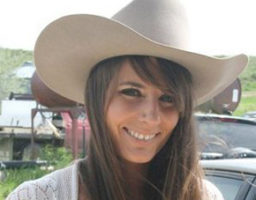Alumni Spotlight
Going Back to Montana
KayCee Gardner, M.D., fulfills her dream of taking care of people (and cattle) in her home state.
 For some, the dream of becoming a doctor begins in childhood. But not for alumna KayCee Gardner, M.D. ’12 — although she had role models, none of them happened to be doctors. At the time, there were absolutely no doctors in Hammond, the town closest to her family’s 20,000-acre sheep and cattle ranch in southeastern Montana.
For some, the dream of becoming a doctor begins in childhood. But not for alumna KayCee Gardner, M.D. ’12 — although she had role models, none of them happened to be doctors. At the time, there were absolutely no doctors in Hammond, the town closest to her family’s 20,000-acre sheep and cattle ranch in southeastern Montana.
Instead, Gardner was kept busy helping with lambing, hunting elk and studying in Hammond’s one-room schoolhouse. She didn’t know then that she would one day commit to practicing medicine in a rural Montana community.
A dream emerges
Gardner was a junior in college, on track to become an engineer, when she realized something was missing from her chosen career path. “I loved math and science, but I realized I needed that element of human contact,” says Gardner.
It wasn’t until she shadowed a doctor on the Northern Cheyenne Indian Reservation that her dream of practicing medicine solidified.
“In some ways, it was a heartbreaking experience — there was a lot of addiction — but I loved connecting with the families and learning about the hardships they faced,” says Gardner. “I realized medicine was the way I could contribute to my community.”
A program for the entire region
That was one thing Gardner was set on — serving her Montana community. Given that goal, the UW School of Medicine’s WWAMI program was an ideal fit for Gardner’s medical education. WWAMI trains physicians and other healthcare personnel from and for the five-state region of Washington, Wyoming, Alaska, Montana and Idaho.
One of the goals of this innovative program is to alleviate the scarcity of physicians in these states, which Gardner experienced firsthand growing up. In 2016, according to the Center for Health Workforce Studies, 15 counties (out of 56) in Montana did not have doctors. Yet WWAMI is making a difference: Today, 42 percent of WWAMI graduates from Montana return there to practice, many of them, like Gardner, in primary care.
Part of the attraction to WWAMI was that Gardner could spend a significant portion of her training in her home state before embarking on clerkships around the region. “Being able to train in Montana was important to me. There’s so much need in these communities, and I wanted to experience what small-town medicine was really like,” says Gardner.
The recipient of a UW Medicine Endowed Scholarship, she was one of the first students accepted to the Targeted Rural Underserved Track, known as TRUST, which offers curriculum and clinical experience specifically in rural medicine. Gardner spent nearly 10 months out of her four years in medical school under the guidance of a rural physician in Lewistown, Montana.
“It kept me grounded,” she says. “I got to know patients on an individual level, over time. After my rotations in Seattle, the doctor I worked with in Lewistown was always asking, ‘What’s the newest, greatest thing you’ve learned? Teach us.’”
Community, caring and cattle
Today, Gardner lives in Miles City, Montana, about a two-hour drive from where she grew up. She owns a ranch and, with the help of her family, is building up her very own herd of Black Angus cattle.
She’s also a family physician. She spends her days delivering babies, providing pediatric care and seeing geriatric patients at the Billings Clinic and Holy Rosary Hospital.
Though her days tend to follow a certain rhythm, Gardner must also be prepared for the unexpected, like the time she delivered 26-week-old twins in the middle of a hailstorm, keeping them alive and stable for hours until they could be flown to a hospital with a neonatal intensive care unit.
Despite the hard work, long hours and unpredictable challenges, Gardner couldn’t imagine doing anything else.
“I enjoy the variety of family medicine — there’s always something new — and everybody knows who I am. People in town are always asking me how I’m doing and so thankful that I’m here,” says Gardner.

